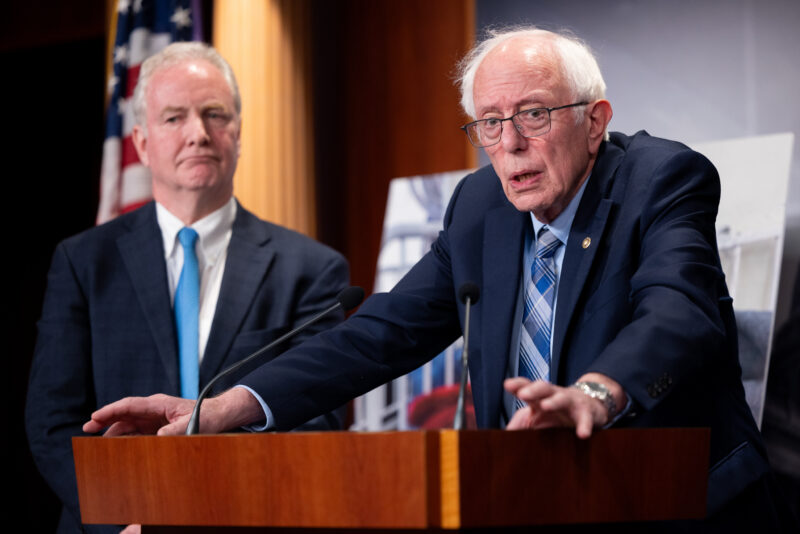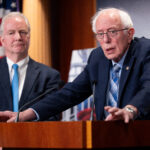‘We cannot look away and we will not be silent’: Harris addresses Hamas sexual violence
The vice president spoke at a White House screening of a documentary on sexual violence committed by Hamas on and since Oct. 7
Anna Moneymaker/Getty Images
Vice President Kamala Harris gives remarks on conflict-related sexual violence at an event in the Eisenhower Executive Office Building on June 17, 2024 in Washington, DC.
Vice President Kamala Harris, speaking at a White House event on Monday, emphasized the need for continued attention to the plight of victims of sexual violence by Hamas on and since Oct. 7, including those still being held hostage.
“These testimonies, I fear, will only increase as more hostages are released,” Harris said. “We cannot look away and we will not be silent. My heart breaks for all these survivors and their families, and for all the pain and suffering from the past eight months in Israel and Gaza.”
In her speech, Harris also highlighted instances of sexual violence by Russia and ISIS, as well as by malign actors in Sudan, South Sudan, Haiti, Ethiopia, Central African Republic and the Democratic Republic of the Congo. A fact sheet released by the White House in connection with the event highlighted several of the same hot spots, but did not mention Israel, Hamas or Oct. 7. A spokesperson for Harris declined to comment when asked about the fact sheet.
Harris said in her speech that “we are deeply concerned by all reports of sexual violence and degredation, and we mourn every innocent life lost in this conflict.” She urged Hamas to accept the cease-fire deal that has been presented. She met shortly before her remarks with Amit Soussana, a former hostage who has recounted being sexually assaulted while she was held in Gaza.
Soussana herself also addressed the audience of feminist, Jewish and other leaders.
“I don’t see myself as a victim. I am a strong, independent woman, and no one can change that,” Soussana said. “The sexual assault I experienced should never happen to anyone under any circumstances. No one should ever be sexually violated. And there are no justifying circumstances for these crimes.”
Soussana said she was lucky to have been freed in a previous hostage deal. She said she feels she cannot stay silent about her experiences, and that she feels a responsibility to speak up for those who are still being held.
“My wounds cannot even begin to heal as long as their suffering continues,” she said. She said that President Joe Biden’s recent speech outlining a possible cease-fire deal gave her hope that the remaining hostages can be released soon.
“I remember telling myself that no matter what happens to me, if I will come out of it alive I would grow stronger from it and not let what happened define me,” Soussana continued. “It will always be a part of my story, but with time the trauma will subside and these difficult events will empower me.”
After Harris’ remarks, the White House screened a portion of the documentary “Screams Before Silence,” which features interviews by former Meta COO Sheryl Sandberg. The vice president commended Sandberg for “all your work to bring to light the horrors of this issue.”
Harris said that the international community has “made great progress” in recent years in combating sexual violence “but that is not enough … the crimes persist and globally our system of accountability remains inadequate.” She said that these crimes must not be ignored or go unreported.
The vice president announced an initiative to improve documentation of sexual violence and to ensure accountability beyond condemnation.
Sandberg told reporters after the screening that it’s important to highlight the sexual abuse Hamas committed because “this is the only thing Hamas actually denies,” as do some “pretty mainstream people” internationally.
“I do not, but if you believe that Oct. 7 was resistance and you see sexual violence — that doesn’t fit into that narrative,” she said.
Anat Stalinsky, the documentary’s director, told reporters that it’s important that the film was screened at the White House, and for Harris to discuss it, so that people “bear witness to what actually happened,” giving the message “endorsement and credibility, and you spread the word.”
Meny Aviram, one of the film’s producers, said the film seeks to highlight two key messages: that the hostages are continuing to suffer and that it’s critical that they are brought home expeditiously. Aviram said he hopes that meeting with Soussana will help provide further motivation for Harris to push for a hostage deal.
Jewish community leaders, particularly feminist leaders, had lamented that national and international women’s groups were slow to speak out about Hamas’ use of sexual violence.











































